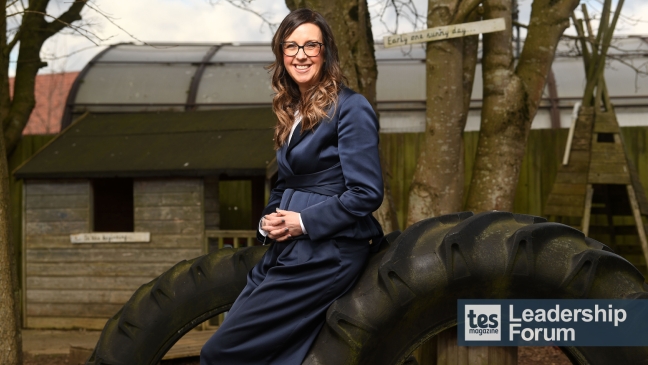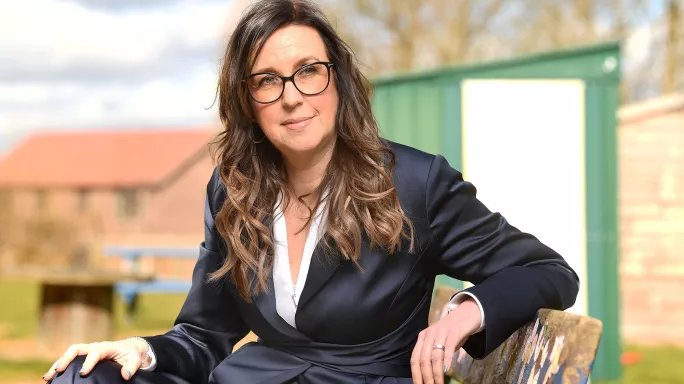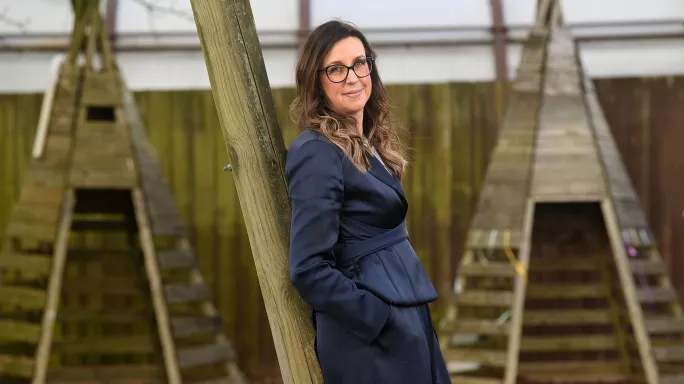- Home
- Leadership
- Tips & Techniques
- Cathie Paine: ‘I see myself as a wandering encourager’
Cathie Paine: ‘I see myself as a wandering encourager’

Cathie Paine is CEO of REAch2, England’s largest primary multi-academy trust. She was formerly deputy CEO of REAch2, an executive headteacher and national education lead, a headteacher and a primary teacher. She writes:
I was a very average student at school. I always had this sense of being an afterthought. I desperately wanted to be seen. That affected how I taught and how I lead: I want to really see the individual pupil and the individual member of the team, and let them know that I see them and that I see them how they want to be seen. I think that’s what most people are crying out for, whatever age they are.
I write and send around 30 handwritten cards every Sunday to acknowledge something great I have seen that week or to tell someone I am grateful for something they have done. If I hear someone has had a bereavement, or they have had a baby, I will send a card, too. I don’t want anyone to doubt that what they do matters or to doubt that they matter.
I got back from maternity leave when I was 25 years old and was handed a glossy National Professional Qualification for Headship brochure by the head. He said, “I see a leader in you”. And so I did the course. I became a deputy head a year later at another school and it went into special measures just before I arrived. Within six weeks of me being the deputy, the head was gone. So I was acting head within six weeks of being a deputy. I was the youngest head in the country. And I didn’t at all know what I was doing. But I loved every second of it. It was everything all at once and I learned so much because people cared for me, and they helped me and I asked for that help.

You can’t compromise on standards. Our job is to make courageous decisions on behalf of children. They need and deserve the very best education. Sometimes, that means giving people all the support to be the best they can be, yet still having to part ways at the end of that. When that happens, you can’t hide behind legal letters or HR. Face it up. Fill the process with humanity. Make sure they walk away knowing that what was done was done well, with compassion.
I see myself as a kind of wandering encourager. And yes, people might see that as a contrived thing that I do. As soon as your head goes above the parapet, at any level of leadership, someone’s going to find something to say that’s critical. But I choose not to delve into that, or doubt my own good intent. If you start worrying that what you do could be misinterpreted by someone else, you are done, really: you’ll never do anything authentically.
As a female leader, there seems to be an obligation on me to talk about how it is “possible” to be both a mother and a leader. I resist that because we don’t ask male leaders the same, and in responding to it, you risk re-enforcing the perception that it is a barrier specific to women. The truth is, any leader has to make sacrifices. Every leader has to find a way to make it work. I would always read my son Billy a bedtime story - I didn’t often know what he’d worn during the day, but I always read him a bedtime story. And I never ever worked on a Saturday, and I never worked during the school holidays. You have to be extremely deliberate in your choices. I realise, though, that’s not as easy now. There has been, since Covid, a presenteeism that means switching off for leaders is harder.
We need to understand that work-life balance is different for every individual. So what you should aim for is not a policy, but a desired outcome: what you want is people who are fizzing with energy but not about to fizzle out. And I think that is a really hard one to judge and I haven’t always judged it right. But by being curious, having regular one-to-ones that are not just about work but genuinely knowing the person, and understanding the contexts, you can better recognise the tipping points.
When you lead, you need to be able to think outside of your own experience. Of course, your story shapes who you are, but it cannot shape what you do. Empathy is critical to that - and understanding that your truth can be very different to that of someone else.
You want people to be able to make mistakes and admit mistakes openly. And that only happens if you lead a certain way. I need to share when I am unsure, my concerns, my vulnerabilities. It can’t be this macho thing at the top, hiding things that are not right. There is a psychological safety in openness that is critical. It’s not weakness to admit fault, to say sorry. I do it all the time!

You need to aim for a 10 out of 10 result. Your North Star. And then you work back from that and see where every element of your organisation is on the journey to that point. I am realistic about the challenges - particularly in a small primary where a tiny change can have a huge effect - but I am relentless in pursuing that endpoint because when you do that, continuous improvement is not a project, it is embedded in the culture.
Leaders can fall into the trap of doing too much fixing, and not enough predicting and preventing. When you are focused on the former, it’s usually too late, things have slipped too far.
I am in a really good phase of my career. I’ve got boundless energy for this job. I’ve got great joy in it. And that’s so important. No one needs a tired me rocking up to work. I’m not paid to be tired. I’m paid to be smart. I’m paid to be full of passion for our vision and our values. And as soon as I feel I am losing my energy, losing my skin in the game, then I will hang up my lanyard and let someone who can bring all those things do the job instead.
Register with Tes and you can read two free articles every month plus you'll have access to our range of award-winning newsletters.
Keep reading with our special offer!
You’ve reached your limit of free articles this month.
- Unlimited access to all Tes magazine content
- Save your favourite articles and gift them to your colleagues
- Exclusive subscriber-only stories
- Over 200,000 archived articles
- Unlimited access to all Tes magazine content
- Save your favourite articles and gift them to your colleagues
- Exclusive subscriber-only stories
- Over 200,000 archived articles
topics in this article




